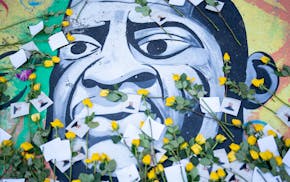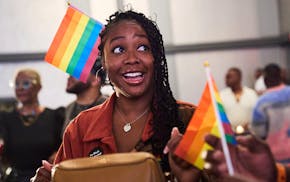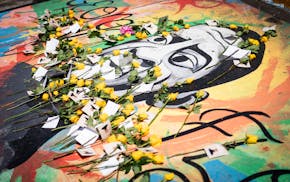Sunday marks five years since George Floyd was pinned by his neck and killed by police in the streets of Minneapolis, sparking a historic wave of calls to action to end police brutality and racial injustice.
Since Floyd was murdered on May 25, 2020, by Minneapolis police, observers have trekked to the city every year on the anniversary of his death to pay their respects and celebrate his legacy.
"It's sad that an event like this had to happen for the community to come together," Eric Coleman, who served as part of a security team Sunday, said as he sat near a huge raised fist that's become synonymous with George Floyd Square. "But in the end, that's what you really want."
Coleman said the day has waned in intensity since Floyd's death. But the anniversary's ability to bring residents together remains. Around 11:30 a.m., about 150 people wandered what is known as George Floyd Square, pausing at makeshift memorials.
On a weekend that is usually reserved for remembering fallen veterans, Floyd's presence can be felt throughout the Twin Cities — from author readings to prayer circles, concerts and more.
On Sunday, there are several planned events to honor Floyd's life, with most of the major activities happening near the intersection of 38th Street and Chicago Avenue where he was killed.
Around 11 a.m., a few dozen people sat in folding chairs in a parking lot for a church service for Floyd held by Worldwide Outreach for Christ. The group was diverse — white and Black, with a Minneapolis Police Department officer sitting among those in the crowd.
"I appreciate this day because the sacrifice [Floyd] made was one that enabled us to realize the needs in all our communities," Pastor Curtis Farrar said to the crowd.
Other scheduled events include an evening gospel concert — featuring popular local choir the Sounds of Blackness — and a candlelight vigil.
This year's theme for the annual Rise and Remember Festival that celebrates Floyd's life in George Floyd Square is "the people have spoken."
"Now is the time for the people to rise up and continue the good work we started," Angela Harrelson, an aunt of Floyd and board co-chair of the Rise and Remember nonprofit, said in a statement.
At nearby Phelps Field Park, a "Justice for George" exhibit will showcase plywood murals from 2020.
Civil rights attorney Ben Crump, the Rev. Al Sharpton and members of Floyd's family are scheduled to hold a memorial and subsequent news conference in Texas, where Floyd had previously lived before making Minnesota his home.
Floyd's death ignited a worldwide movement not only to make changes in policing but also to address systemic racial inequities in other areas of society. However, the commitment to that global movement's long-term legacy has been debated.
This year's milestone anniversary is marked by a stark contrast in the political atmosphere and societal acceptance of policing reforms, equity and racial justice work that had been widely called for in the aftermath of Floyd's death in 2020.
On Wednesday, the Department of Justice filed to dismiss a consent decree agreement with Minneapolis that was supposed to entail sweeping reforms. There have also been rumors that President Donald Trump, who was the president when Floyd was killed, might pardon former Minneapolis police officer Derek Chauvin, who was convicted in Floyd's murder. Publicly, Trump has given no credence to the rumors.
The Trump administration has also tried to ban diversity, equity and inclusion programs throughout the country in public as well as private organizations.
On Sunday morning outside what is now known as Unity Foods, Tom Johnson made his way through the flower-strewn memorial that marked where Floyd begged for air. Johnson, who lives in Golden Valley, said the holiday weekend was a fitting occasion to pay his respects to Floyd and "commemorate the taking of Black lives."
Johnson said the current political "backlash," especially the Trump administration's campaign to dismantle diversity and equity initiatives, has cast a pall over the already somber day.
Still, the 74-year-old said he hasn't lost hope that "a better society" will prevail. Visiting the square was a small way to push back against the presidential administration, Johnson said.
"I don't know what to do. ... It's something," he said.
For people who live nearby, Floyd's death has left a more complicated legacy.
"People come here to pay respects, take pictures and leave," said 49-year-old Marquise Bowie, who lives two blocks away from the square. The people who live and work in the area "need more than just a celebration of a person," he said. "We need resources."
Since 2020, Bowie said not much has changed. The community still badly needs more investment and rates of Black homeownership remain low, he said. Meanwhile, many of the businesses that line the corridor haven't benefited from the droves of outsiders who visit the square.
"I see our neighborhood just become a tourist spot without the financial benefits of tourism," he said.

Five years later, Minneapolis remembers George Floyd

Israel's latest strikes in Gaza kill 38 people including children

In an uneasy climate, diverse pride groups converge on DC with differing interests but common goals

How the Minnesota Star Tribune covered the five-year anniversary of George Floyd's murder

